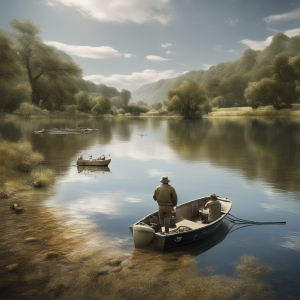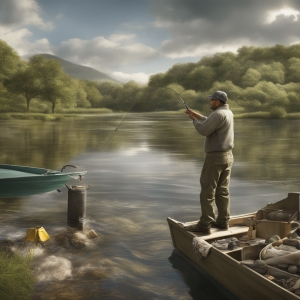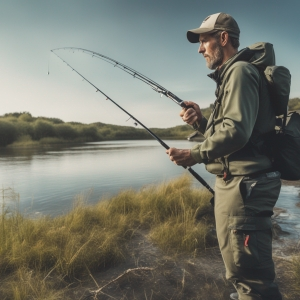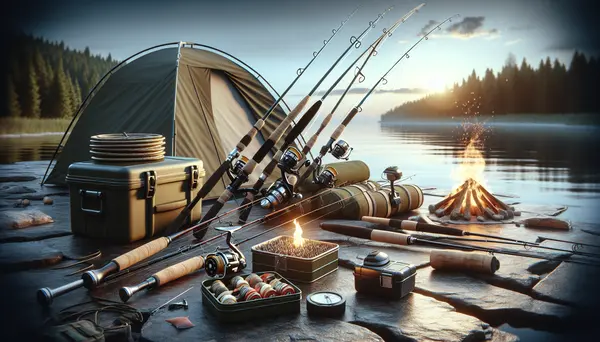Table of Contents:
Whether you're a seasoned angler or a beginner just venturing into this enjoyable pastime, today's article will take you on a journey beyond familiar waters. Welcome to your go-to-guide for exploring international angling destinations.
Fishing Beyond Borders: Introduction
Fishing is a universal pastime, loved for its peacefulness, thrill, and connection to nature. However, whispering waters and the promise of a new catch aren't only limited to native territory. In fact, worldwide, there are multitudes of breathtaking international angling destinations awaiting discovery. Fishing beyond borders gives you the chance to both catch a diverse array of fish species and explore unique landscapes. It's not only about the fishing experience—it's about immersion into new cultures, cuisines, and ways of life. In short, it's a deep dive into a fascinating world, armed with a fishing rod.
Whether you’re an angling enthusiast looking for a new challenge, or simply someone who loves an exciting vacation immersed in nature, fishing beyond borders is the adventure you've been waiting for. In today's article, we'll uncover some of the world's most attractive fishing spots, each with its unique appeal and species. Happy fishing!
Understanding International Angling
International angling, or fishing beyond borders, takes the familiar pastime of fishing and gives it an exhilarating twist. Instead of casting lines in your local pond or river, international angling encourages you to explore the world's waterways, oceans, and lakes to discover new fishing challenges and experiences.
To fully embrace and master the art of international angling, it's crucial to do some research before setting off. This includes understanding different types of fishing techniques, knowing about the specific fish species native to the chosen location, and learning about the local fishing regulations. Remember, each country has its fishing rules, often designed to protect local fish populations. Violating these rules can have consequences, so it's always wise to familiarize oneself with them.
So, whether you're hoping to reel in a salmon in Alaska, a Mahseer in India, or a Barramundi in Australia, a little bit of knowledge goes a long way. With a spirit of adventure and a touch of planning, international angling can be a life-changing experience, bringing fresh insights and unforgettable memories.
Comparative Analysis: Advantages and Disadvantages of International Angling Destinations
| International Angling Destinations | Pros | Cons |
|---|---|---|
| Norwegian Fjords | Rich in diverse species, beautiful scenery | Expensive travel and accommodation |
| Amazon River, Brazil | Unique freshwater species, adventurous fishing | Requires special equipment, potential health risks (e.g., mosquitos) |
| Florida Keys, USA | Easily accessible, variety of species, professional guides available | Overcrowded, regulated fishing seasons |
| Great Barrier Reef, Australia | World's largest reef system, abundant marine life | Long-distance travel, government restrictions on certain species |
| Andaman Sea, India | Less crowded, rich in rare species | Unpredictable weather, less developed fishing industry |
Popular Worldwide Angling Destinations

Now that we've explored the concept of international angling, let's take a closer look at some of the world’s most celebrated fishing destinations. Each of these locations offers something unique, from the species you can catch to the stunning natural landscapes that surround you as you fish.
Alaska, USA: Home to spectacular freshwater and saltwater angling opportunities, Alaska's icy waters are abundantly populated with salmon, halibut, and rainbow trout.
Norway: Known for its raw, untouched beauty, Norway's deep, fjord-filled waters are a haven for Atlantic salmon, another reason for anglers to flock to this Scandinavian paradise.
New Zealand: This land of endless natural beauty offers some of the worlds best spots for fly fishing, with its rivers teeming with Brown and Rainbow trout.
Seychelles: A veritable paradise for saltwater fly-fishing, Seychelles offers battles with Giant Trevally amidst some of the most stunning marine scenery in the world.
Costa Rica: With its rich Pacific and Caribbean coasts, Costa Rica boasts exceptional game-fish diversity, featuring Marlins, Sailfish, and Rooster Fish.
Each destination has its charm and specialty, and choosing one depends on what you’re chasing - be it the prospect of a challenging catch, the siren call of exotic species, or the allure of fishing in uniquely breathtaking landscapes. Remember, successful international angling always involves respectful and mindful engagement with the environment and the local culture.
How to Prepare for an International Fishing Trip
Preparing for an international fishing trip involves more than packing your trustworthy fishing gear. It's about carefully considering the location, knowing what to expect, and being ready to adapt. The first step is to pick a location, based on your preferences and the type of fish you aim to catch. Once you've selected a location, conduct a thorough research about local laws, regulations, and fishing etiquette to ensure that your angling adventure is enjoyable and respectful of the local environment.
Weather impacts greatly the fishing conditions. Therefore, looking up the climate and weather patterns of your chosen destination will help you determine the best time to go fishing, what type of gear to bring, and what to wear during your fishing trip. Be sure to pack accordingly!
Additionally, understanding the types of fish in your chosen destination and their behaviors will improve your odds of making a catch. Familiarize yourself with their feeding patterns, the types of bait they respond to, and the most effective techniques to lure them.
A common mistake many anglers make is not checking the compatibility of their gear with the fishing conditions at their international fishing destination. To avoid this, always ensure that your fishing gear is suited to catching the types of fish available at your selected location, and is also suitable for the local water conditions. If you're unsure, many fishing locations offer rental services for appropriate equipment.
Lastly, make sure you observe all necessary travel preparations, like securing a visa, if needed, and ensuring that your travel insurance covers your fishing activity. With these steps, you will be well-prepared for an unforgettable fishing adventure beyond borders.
Legalities and Rules in International Angling

Fishing beyond your local areas is thrilling but also requires strict adherence to new rules and guidelines. Each country has its unique law and guidelines about fishing rights, permits, fish size, type, and bag limits. While some may allow more freedom, others will be particularly strict, especially concerning protected species. The objective behind these rules is generally to safeguard marine life and maintain their population levels.
Consequently, breaking these laws, knowingly or unknowingly, can lead to penalties or even legal trouble. This is why it’s crucial to inquire about and respect local fishing laws and regulations before embarking on your fishing trip. You can do a quick search online or reach out to the local fisheries office to get this information. International to local angling associations may provide useful pointers as well.
Permits are an essential aspect of fishing laws to remember. Many locations require anglers to have a fishing license before they can fish legally. The cost and procedure to obtain these licenses vary from place to place but are usually straightforward.
Moreover, ethical angling practices like catch-and-release are encouraged to sustain fish populations. These practices involve unhooking and returning the caught fish into the water with minimal harm. It's not always mandatory, but it's a hallmark of a responsible angler. Finally, remember to leave no trace behind to help conserve these beautiful fishing sites for future generations.
The Impact of Climate and Season on Fishing
Climate and seasons play a pivotal role in fishing, and their effects become even more pronounced when you're angling in unfamiliar, international waters. The climate affects the behaviour of fish, influencing their feeding habits, breeding cycles, and general activity.
In warmer climates, for example, fish may dive deeper into the water to keep cool, affecting the success of your angling. Similarly, cold climates can inhibit certain species' activity, making them less receptive to your bait. Seasonal changes also impact fish populations, with many species spawning at specific times of the year, making them more or less abundant in the waters.
Before embarking on your international angling journey, it's crucial to understand the climatic conditions and seasonal patterns of your chosen destination. Knowing when fish are most active and what kind of weather they thrive in will significantly improve your chances of making a good catch.
This knowledge will also inform your choice of fishing gear and clothing. For instance, you'll opt for warmer clothing for fishing in colder climates, and vice versa. Understanding the climate will also guide you in selecting suitable fishing gear; rods, reels, and baits are often designed to work best in specific weather conditions.
To sum up, a crucial part of fishing beyond borders is adapting to different climates and seasons. Be prepared to adjust your tactics, gear, and expectations to align with the environmental conditions- that's the essence of being a successful global angler!
Pack Smart: Essential Gear for International Angling

While packing for an international angling adventure, consider not only the obvious gear such as fishing rods, hooks, and lines but also other essentials that will make your fishing experience more enjoyable and comfortable. Given the diversity of fishing conditions you're likely to encounter, it’s important to think about versatility and functionality.
First and foremost, a durable and travel-friendly fishing rod is essential. Depending on the size and type of fish you're after, you may require different rods. Consider versatile rods that can handle a range of fishing environments. Quality fishing line and a variety of hooks are also important, as well as a good net for landing your catch.
Remember, you'll be enjoying your fishing adventure in the great outdoors, so packing suitable clothing is important. Regardless of your destination, a waterproof jacket is a must to protect you from unexpected weather changes. If you’re heading to a hotter climate, don’t forget a hat, sunblock, and sunglasses to protect you from harmful UV rays. For colder locations, thermal clothing, gloves, and a warm hat will make for a more enjoyable experience.
Think about safety too. A well-stocked first-aid kit, a flashlight, and a multi-tool can come in handy during emergencies. If you're embarking on an offshore angling adventure, life jackets and distress signals should be at the top of your packing list.
Finally, consider investing in a guidebook or map of your chosen destination. This will provide invaluable local knowledge and increase your chances of landing a fantastic catch. Fishing beyond borders is an adventure of a lifetime - make sure you're well-prepared for it!
Cultural Considerations in International Angling
While international angling is undeniably exciting, it's crucial to remember that each fishing destination is part of a unique cultural landscape. Adapting to local practices and cultural norms is paramount when visiting and fishing in a new country. From respecting spiritual beliefs tied to local water bodies, to understanding traditional fishing techniques, being sensitive to local culture enriches the experience and promotes mutual respect.
Keep in mind that in many regions, fishing forms an integral part of community livelihood and traditions. Therefore, it's all the more important to respect any local rules and traditions related to fishing. Sometimes, these practices might even work to your advantage, offering insider tips on the best spots or methods to reel in a prized catch.
Lastly, do remember that language barriers may exist. So, equipping yourself with local language basics could prove helpful and enhance interaction with local anglers. Sometimes, a friendly smile and shared passion for angling go a long way in transcending any language barriers. Embrace the opportunity for cultural exchange and understand that in fishing, as in life, the journey matters as much as the catch.
Conclusion: The Thrill of International Angling
As we've ventured through the realm of international angling, it's clear to see this isn't just fishing as usual. It's an adventure, a journey into new territories, cultures, and experiences. It presents new challenges and uncharted waters—literally! It takes the familiar tranquillity of fishing and pairs it with the buzz of exploration.
Whether you're after the catch of a lifetime or seeking a different kind of holiday, fishing beyond borders offers something unique. But it's worth remembering, the aim isn't simply to reel in an impressive catch; it's about the experience, the scenery, the people you meet, and the memories you create.
So, why not make your next holiday an angling adventure? Create your own tale to tell your fellow anglers back home about 'the one that didn't get away' on foreign shores. By stepping out of your comfort zone and embracing the thrill of international angling, you may find fishing to be even more rewarding and memorable than ever before.
FAQ for Exploring International Fishing Destinations
What is international angling?
International angling refers to the practice of fishing beyond one's borders, exploring diverse fishing spots around the globe.
Why should I consider fishing internationally?
Fishing internationally allows anglers to experience different types of fishing, explore unique cultures, and enjoy diverse ecological environments.
What are some top international angling destinations?
Some top international angling destinations include Norway for its sea fishing, Costa Rica for its big-game fishing, and Canada for its freshwater fishing.
What gear should I take when angling internationally?
This depends on your destination and the type of fishing you'll be doing. However, a good quality rod, diverse lures, hooks, lines, and an appropriate reel are basics you should consider.
What are the necessary preparations for international angling trips?
Some necessary preparations include researching about the location, checking seasons and weather forecasts, understanding regulations regarding fishing in the destination, and ensuring you have the necessary fishing gear and documents.







